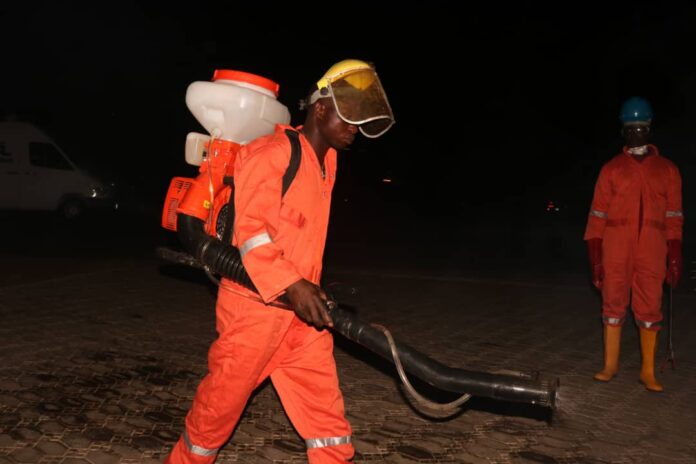In a bid to address the persistent issue of post-harvest losses in Nigeria, the Sasakawa Africa Association (SAA) has launched a groundbreaking training program for local agricultural machine fabricators. The initiative is set to equip fabricators with the skills to create machines that will reduce crop waste, improve farming efficiency, and empower smallholder farmers.
The program is part of a larger effort known as the Evidence-Based Regenerative Agriculture to Address Climate Change in Africa project, which is supported by the Policy and Human Resource Development Grant (PHRDG 1) from Japan, in collaboration with the African Development Bank (AfDB).
Training in Nasarawa State Marks a Key Milestone
The first session of the training began in Nasarawa State, with 20 local fabricators from communities such as Obi, Lafia, Keffi, and Nasarawa Eggon. They are being trained in the production of multi-crop threshers—a vital tool in reducing post-harvest losses. This training follows a similar initiative in Kano in 2023, where 45 fabricators were trained to create machines that help farmers handle crops more efficiently.
The training is being held at the Institute for Agricultural Research (IAR) at Ahmadu Bello University, Zaria, Kaduna State, within the Department of Agricultural Mechanisation and Bioresources Engineering workshop. It is expected to run until November 21, 2024.
A Mission to Reduce Losses and Increase Farmer Resilience
Dr. Godwin Atser, the Country Director of SAA Nigeria, emphasized the importance of the initiative. “This training highlights our commitment to reducing post-harvest losses through the upskilling of local fabricators, enabling farmers to access simple mechanisation tools,” Dr. Atser said.
He further explained that the program aims to empower local farmers with affordable technology that boosts agricultural productivity, especially in light of the challenges posed by climate change.
“By building the capacities of local fabricators to produce essential agricultural machines, we are enhancing productivity and ensuring a more food- and income-secure farmer population,” Dr. Atser added.
Empowering Local Communities and Strengthening the Economy
One of the major goals of the initiative is to create jobs and strengthen the local economy. The training will allow fabricators to provide farmers with cost-effective mechanisation solutions. This is crucial for improving farming efficiency and minimizing the large-scale crop losses that currently plague Nigerian agriculture.
Usman Jibrin, a 28-year-old trainee from the Akurba community in Lafia Local Government Area, expressed his enthusiasm for the training. “I am truly grateful for this chance,” Jibrin said. “I promise to diligently upskill and utilise the knowledge I gain to support SAA’s efforts in reducing post-harvest losses in my community.”
He shared that farmers in his community face significant challenges during harvest time. “Farmers in my community spend long hours harvesting; the harvest is tedious, and some grains are lost due to prolonged harvest periods. When I get back home after this training, I will produce a thresher and start supporting our farmers to tackle these challenges.”
A Critical Partnership for Nigeria’s Agricultural Growth
Professor Ado Yusuf, the Executive Director of the Institute for Agricultural Research (IAR), praised Sasakawa Africa’s role in providing practical post-harvest solutions. “SAA has been a vital partner in bringing practical solutions to Nigerian farmers,” Professor Yusuf said. He added that the training curriculum is comprehensive, covering welding and fabrication techniques, metal cutting, and safety practices.
The focus on multi-crop threshers is significant, as these machines are crucial in separating grains from crops after harvest, a process that typically causes significant loss if done manually.
Addressing the Impact of Post-Harvest Losses
Post-harvest losses remain a critical challenge in Nigeria, especially in rural communities where farmers struggle with outdated tools and inadequate technology. According to a report by the Food and Agriculture Organization (FAO), nearly 50% of the food produced in developing countries like Nigeria is wasted after harvest due to inefficient handling, processing, and storage methods.
The introduction of affordable, locally-made mechanisation tools is expected to reduce these losses, ultimately leading to higher food production and improved livelihoods for farmers. The training program also aligns with SAA’s broader goal of promoting sustainable agricultural practices that can withstand the impacts of climate change.
Looking Ahead: Scaling Up the Training Program
As the training session in Nasarawa State nears completion, Sasakawa Africa has indicated plans to expand the program to other states in Nigeria. The goal is to create a network of skilled fabricators across the country who can supply local farmers with the necessary tools to improve their productivity and reduce waste.
Dr. Atser noted that scaling up the program would have significant benefits for Nigeria’s agricultural sector. “If we can replicate this model across other states, we will see a considerable reduction in post-harvest losses, improved food security, and an overall boost to the Nigerian economy,” he said.
Sasakawa Africa’s training program marks an important step towards addressing one of Nigeria’s most pressing agricultural challenges. By equipping local fabricators with the skills to produce essential machinery, the initiative promises to support farmers in maximizing their yields and reducing waste.

